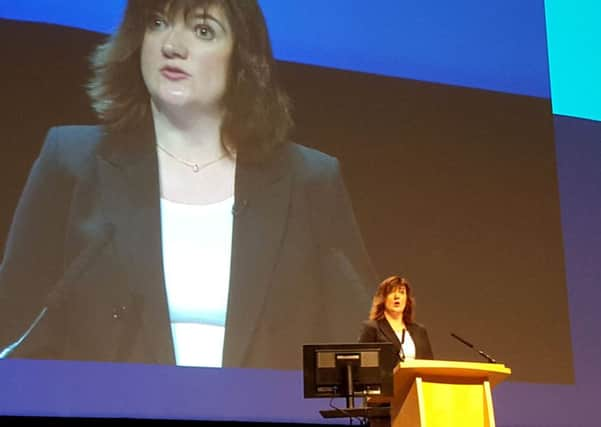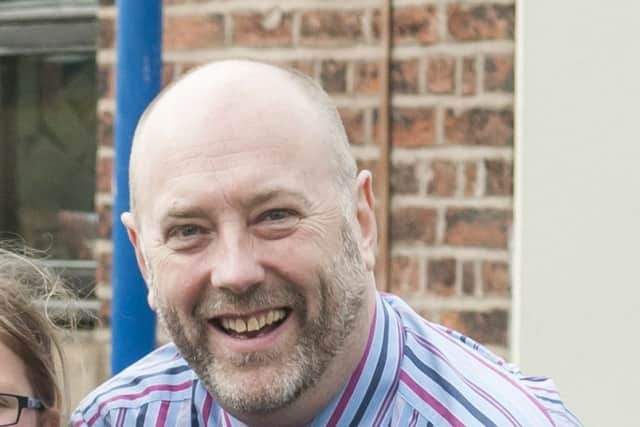Headteacher's fears over imposed Academy status


Andy Mellor is headteacher of Blackpool’s only mainstream primary school to be rated ‘outstanding’ by Ofsted, St Nicholas Primary. But it is not an Academy – here, in his role as the North West representative of the NAHT, he argues why schools shouldn’t be forced to become academies, despite the government’s plans.
Last weekend, at the National Association of Head Teachers’ Annual Conference I asked the Secretary of State Nicky Morgan a question. I wanted to know why she thought it would be a good idea for the school where I’m a headteacher to convert to academy status.
Advertisement
Hide AdAdvertisement
Hide AdThe government wants all schools to become academies by 2022. That means taking over 16,000 schools out of the control of local authorities and putting them into Trusts, which will look after groups of different schools. That’s the largest structural reorganisation of schools since state education was invented. It’s reckoned that the cost will be over £1bn and for many school leaders like me, it will be a massive distraction from what we care about most: giving the children in our care the best start in life that we can.


You see, my school has just been rated outstanding by Ofsted, the schools’ inspection service. Most of the schools in England – 84 per cent in fact – are rated good or outstanding, so it’s right that we ask the government to explain why they think that this huge top-down reorganisation of schools is really necessary. It’s right that parents ask this question too.
If you’re feeling bad about not knowing what an academy is, please don’t. For most parents the way a school is run isn’t that important. Where there are problems with an individual school, it’s doubtful that converting it into an academy would make a difference. What counts is the quality of teaching and learning – what happens in the classroom, not the boardroom, if you will.
So when I spoke to Nicky Morgan on Saturday, I wanted to know what she’d say that I’d be able to repeat to the parents at my school about what a good or outstanding school stands to gain from being an academy. Mrs Morgan repeated the freedom, autonomy and standards argument which for a good or outstanding school really doesn’t apply. Good and outstanding schools have more choice and autonomy than ever before. So I still don’t know what the reasons are for converting.
Advertisement
Hide AdAdvertisement
Hide AdWhat concerns me, is that Mrs Morgan said that she has put £500 million to one side to convert the remaining 75 per cent of schools. This is on top of the £950 million which has already been spent in converting existing schools to academies. This is at a time when apparently we have to constrain public spending and we as taxpayers are experiencing the effects of the austerity plans put in place by the government.


I spoke to several headteacher colleagues at the NAHT conference who have had to make teachers redundant because of the cut in funding to schools in real terms and yet the Secretary of State appears to have money to burn.
Academies have been around for some considerable time now and our educational landscape is now enriched by a wide variety of choice. There are free schools, voluntary aided schools, voluntary controlled schools, academies, maintained schools run by the local authority and obviously those schools outside the state funded sector.
The variety of choice is what successive governments have sought and the state sector has responded. In total around three quarter’s of state schools are not academies and around a quarter are. In the primary sector, only 18 per cent of schools are academies.
Advertisement
Hide AdAdvertisement
Hide AdForcing schools to become academies has been the tool of choice for government to address what they call “failing schools.” The thinking is that if they are taken over by a multi academy trust (MAT) or chain of academies then they will be forced to raise standards. There is no firm evidence that this has taken place.
In Blackpool we have a mixture of schools, academies, academy chains and MATs. However in Lancashire, academies are relatively rare. So, given the number of academies that there are, why are so many academy headteachers and headteachers generally against the governments’ latest proposed legislation in the recent White Paper? This proposed legislation says that the government intends to allow schools four years to “make the right choice” to become an academy. What it goes on to say is that all schools will be made to become an academy by 2022. The Department for Education (DfE) says that being an academy will provide schools with autonomy and freedom to make decisions and will raise standards. Let me be absolutely clear here; I would defend the right of any school to convert to academy status if it is right for their school and community in their specific context.
The bottom line for schools is that the government, despite using the word ‘choice’, intends to impose academy status on schools, having previously induced, cajoled and pushed schools towards converting. Forcing all schools to become academies is a huge gamble by the government and assumes that the relative security of the local authority can be dispensed with in favour of a new world as yet uncharted. It’s taking a gamble with schools and by association, with the education of children and wasn’t included in the Conservative manifesto. No wonder so many Conservative MP’s and councillors are now questioning the direction of travel that Nicky Morgan has set us on. It would mean that despite trying to pick their way through the mess left by this year’s DfE assessment chaos, heads would be trying to go through the legal framework of academisation and where they go next, while tackling teacher shortages, reduced budgets and redundancies at the same time trying to raise educational standards.
Far from freeing headteachers to concentrate on teaching and learning and making the most progress that they can with their children in school, the government is creating turbulence and uncertainty where there doesn’t need to be any and which deflects heads from their core business.
Advertisement
Hide AdAdvertisement
Hide AdThe “choice” of academisation is nothing more than an instruction to convert, despite Nicky Morgan praising headteachers for their work at the NAHT conference. It is essentially a tool to remove the local authority and place direct power for schools in the hands of Westminster and not headteachers. Essentially politicians running schools not headteachers.
It remains to be seen whether Nicky Morgan will be able to push her plans through but there is already growing opposition, even from within her own party to a gamble which has already cost the taxpayer millions at a time when the country can least afford it.